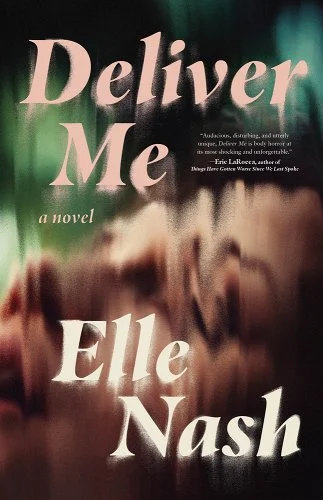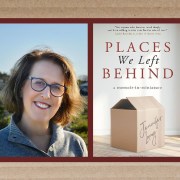[ad_1]
My first encounter with Elle Nash’s work was Animals Eat Each Other, and since then I’ve been hooked. Her short story collection, Nudes, broke my heart in the best way, and Gag Reflex (written in the style of a LiveJournal from 2005) delivers measured doses of eating disorder vulnerability amid tenuous teenage social structures. I’ve been waiting for her new novel since she first hinted at its existence on social media.
Deliver Me, tells the story of Daisy, or Dee-Dee, as she goes by, who fakes a pregnancy. Dee-Dee’s pathological desire to become a mother becomes untethered from reality when her childhood friend moves into the building. Sloane seems to click instantly with Daddy, Daisy’s insect-loving boyfriend and the intended father of her imagined child. The tension is palpable as we await the inevitable moment when Dee-Dee is found out, and Nash’s writing is beautifully visceral, as she moves seamlessly between the erotic and and horrific elements of having a human body. This book is something you need to feel.
Elle and I spoke over Zoom to discuss motivations, the psychology of kink, teen bisexuality, and Missouri.
This interview has been edited for clarity and length.

Charlene Elsby
The book was inspired by a news article, and there’s a similar article at the end of the text. Is that an exact transcription or just something inspired by actual events? And what exactly about that article made you want to do a deep dive?
Elle Nash
It’s not an exact transcription of the event, no, but it was my first encounter with this kind of crime. The first thing that really struck me about it was that it was so close. Like, here’s this freak incident that’s happening near me—I’d always been interested in proximity to crime because Columbine occurred forty minutes from me; like the world has this violent core and yet we are all going on ignorantly with our lives because we are untouched by its vortex. The second thing was that when I delved deeper into it, I was like, how does someone fake a pregnancy for nine months, and nobody in her life notices? And why? I learned that some people who have experienced this kind of phenomenon, they may for some time perceive that they are pregnant and dissociate, and at the same time have the lucidity to hide that they’re not pregnant. I was like, why does someone want a baby so bad that they’re driven to that? This was before I was a mom. I think it was the year that I was getting married. Then I put the idea away for three years.
Charlene Elsby
Have you ever felt this personal obsession with babies that the character reflects? Or is the interest more academic?
Elle Nash
Well, it was kind of both. I did a lot of reading on it. Interestingly, around 2014, I did get intense baby fever. It was surprising to feel this urge to start a family, and it’s interesting because I kind of look at it and I’m like, did I want to start a family, or did I hold an idealized version of motherhood and stay-at-home mom life, because I wanted to exit the workforce? I was burned out. For a few years I was having idealized visions of living in the woods and being a prairie mom. I didn’t have a baby until three or four years later. When I look back on my idealization of it, I’m like, oh, wait, no, stay-at-home motherhood is not exiting the workforce. I’m actually entering into labor 24/7. It is kind of funny to look back and see how the idealized version and reality are so different from what I expected.
Charlene Elsby
Let’s talk about that idealization. The exact part of the book where I was like, “Okay, Daddy is not exactly an ideal partner, and she definitely knows,” is when he refuses to work with Daisy at the meat processing plant. Like he thinks he’s too good for it. But even so, she’s almost obsessed with him, and she maintains this paranoid, hypervigilant state about this man that she might not even like that much. I was hoping you could expand on that dynamic.
Elle Nash
Yeah, definitely. Daisy grew up in a very restrictive and servile type of household and community, coming from an ex-religious background. I think that creates and can foment a certain kind of codependence and fear. Like a fear of life without this person’s structure or approval. It creates this feedback loop. Daisy, for example, is able to overlook some of the more egregious ways people are treating her, or she overlooks certain aspects of his behavior, because there’s something else that she’s getting out of it, and it validates her world view. Like, there is violence out there. Violence exists. And then there’s this person that one day, whenever that violence is going to come for her, is supposed to be that person that can shield her from it or be whatever ballast she needs. At the same time, Daddy is also deluding himself. Daisy is lying to him about her pregnancy, and she’s always people-pleasing. It’s hard to know a person when they’re in people pleasing mode. Because you’re like, is this genuinely you? You kind of have to trust they’re being genuine, but then you get the sense that maybe you never really know who they are or what they truly want. That dynamic plays out heavily between them. I wanted to examine that type of codependence.
Charlene Elsby
I want to know how far you delved into the psychology of Daddy’s bug fetish, because the part where you described that origin story sounded really familiar to some anecdotal descriptions I’ve heard where innocuous non-sexual things become sexual through some kind of imprinting experience. Did you do a lot of research?
Elle Nash
I did do a lot of research. I’ve always been interested in weird kink, and even from an observational aspect, I’ll come across random porn or whatever and want to look at it, just because I’ve never seen it before. Because the human experience is expansive and interesting. It expands my worldview, what the human mind is capable of, from killing to loving. Human behavior in that respect is completely fascinating. I also did a lot of research trying to understand the way that obsession works and drives behavior. I feel like it unlocked a lot for me in trying to understand serial killer behavior too, (it’s not the same as serial killer behavior, but…) because of how obsession controls mental impulses. Impulsivity is something that all people deal with, right? I was trying to think of it in terms of someone who has these intrusive thoughts and where that origin story begins. We’ve all had some kind of intrusive thought. And when it links to pleasure, some people with impulse control problems will start to press their boundaries. That’s actually very basic human behavior, but it’s expressed in this mode of, like, very anti-social, very anti-community behavior. The human experience is prismatic. Even all the ugly, horrific things. I’m really interested in that. I don’t know why, but I am.
Charlene Elsby
A part that really stuck out to me was the spell/ritual scene where Sloane pulls out Daisy’s tampon. Maybe that’s body horror, but I saw a level of intimacy between Daisy and Sloane. Like, it’s about their relationship. I wonder if you could help categorize that—what’s going on between those two?
Elle Nash
Daisy definitely has an intense sexual and emotional attraction to Sloane. She wants to be with her, but she’s unable to even name these feelings or categorize them, because of how she’s grown up. Like, she doesn’t even necessarily have the words. There’s only one point in the book where she reassures herself it’s completely normal she’s having these kinds of thoughts. But she knows there’s danger with that. And because expressing these feelings is not a language she has, we never know if Sloane reciprocates those feelings, or if she’s just utilizing Daisy’s attention. In some ways that can mirror (I would say, as a bisexual) your first experiences with other women, when you are a teenager and realize you’re attracted to women where you’re like, “Is this a thing between us? Or is it just friendship?” It can be hard to suss out when it’s unspoken. But Daisy definitely has that attraction, and she doesn’t know what to do with those feelings. And that is why throughout the rest of the novel, she ends up having this obsessive competition with Sloane, pushing her boundaries and having this impulse control issue of wanting to touch her and not knowing what else to do, just for her specific psychology. She’s unable to express it, but she projects it out into her world.
Charlene Elsby
There’s no point at which she ever seems to conceive that there could be a future with Sloane. As far as society is concerned, she’s in the straight box. She’s got to have her baby, right? It just seems like… how do we express this?
Elle Nash
Compulsory heterosexuality.
Charlene Elsby
Compulsory heterosexuality. It is always assumed that she will stay with Daddy and have the baby, and yet she does have these compulsive tendencies towards Sloane that get expressed in strange ways.
Elle Nash
I would say so. There is one scene when they are teenagers where she’s thinking, we could run away together and take care of this baby. But that is squashed. I don’t even think she believes she’d be capable of that. Like she’s so dependent on the structures in her life, that I think she can’t see past them to the point where it would ever be feasible.
Charlene Elsby: The book takes place in Missouri. Tell me about the Midwest. As in, what are the defining characteristics of the region that come through in the book?
Elle Nash: I lived in Northwest Arkansas, which is really close to the corners of Oklahoma and Missouri. We lived in a cabin with no running water and no latrine or anything for a bit. It was a dry county, so we would drive five minutes to the Missouri border and get alcohol. The Ozarks is really beautiful. It’s rolling hills, lakes full of trees—so beautiful. It’s easy to get lost; you feel like it’s this protected little pocket of the country with a lot of different types of people, because you have your hippies, but you also have your flat Earthers and your anarchic forest punks, Christians of three different flavors, people who are working class and people who are unemployed. You also have extreme wealth, because the head of the Wal-mart headquarters is right there in Bentonville. There’s an art museum that has some of America’s best art just in this little area of northwest Arkansas—that’s where I saw my first Louise Bourgeois Maman Spider, which is kind of funny, all this art funded by a Wal-Mart heiress in the heart of flyover country. You also have the huge meat packing facilities.
Charlene Elsby
I thought a really affecting aspect of your novel was the representation of that kind of living. How important is it to you to represent people without money?
Elle Nash
It’s really important to me. And a big part of it is I feel that when you see a working class story come out of a big press that’s going to get massive market penetration, it is nine times out of ten going to be a kind of emotional pornography, where the main plot seeks to exploit the narrative of poverty as a way to elicit some kind of sympathy or pity. In college, I think there was this type of person, the trust fund kid who “slummed it” as a way to erase his bourgeois guilt. I feel like that is a similar kind of concept. Whereas, living in Arkansas and other parts of the south, having lived on WIC/food stamps/Medicaid, you’re like, there’s so much more to this experience than the plot of being broke and poor! There’s culture out there from people who are working class. We’re just living our lives. And I think it’s important to see that.

FICTION
Deliver Me
By Elle Nash
Unnamed Press
Published October 3, 2023

[ad_2]
Source link

